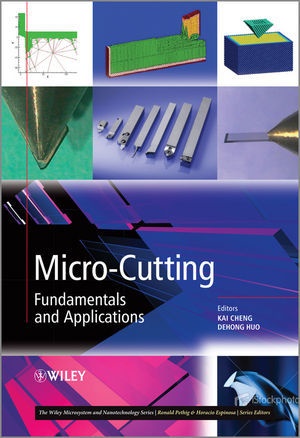Read more
Informationen zum Autor Kai Cheng, Brunel University, UK Professor Kai Cheng holds the chair professorship in Manufacturing Systems at Brunel University. His current research interests focus on micro manufacturing, design of precision machine tools, and global/sustainable manufacturing and systems. Professor Cheng has published over 160 papers in learned international journals and refereed conferences, authored/edited 5 books and contributed 6 book chapters. Professor Cheng is a fellow of the IET and IMechE. He is the head of the Advanced Manufacturing and Enterprise Engineering (AMEE) Department at Brunel, which consists of 10 academics and over 30 research assistants and PhD students. Professor Cheng is the European editor of the International Journal of Advanced Manufacturing Technology and a member of the editorial board of International Journal of Machine Tools and Manufacture. Klappentext Micro-Cutting: Fundamentals and Applications comprehensively covers the state of the art research and engineering practice in micro/nano cutting: an area which is becoming increasingly important, especially in modern micro-manufacturing, ultraprecision manufacturing and high value manufacturing.This book provides basic theory, design and analysis of micro-toolings and machines, modelling methods and techniques, and integrated approaches for micro-cutting. The fundamental characteristics, modelling, simulation and optimization of micro/nano cutting processes are emphasized with particular reference to the predictabilty, producibility, repeatability and productivity of manufacturing at micro and nano scales.The fundamentals of micro/nano cutting are applied to a variety of machining processes including diamond turning, micromilling, micro/nano grinding/polishing, ultraprecision machining, and the design and implementation of micro/nano cutting process chains and micromachining systems.Key features* Contains contributions from leading global experts* Covers the fundamental theory of micro-cutting* Presents applications in a variety of machining processes* Includes examples of how to implement and apply micro-cutting for precision and micro-manufacturingMicro-Cutting: Fundamentals and Applications is an ideal reference for manufacturing engineers, production supervisors, tooling engineers, planning and application engineers, as well as machine tool designers. It is also a suitable textbook for postgraduate students in the areas of micro-manufacturing, micro-engineering and advanced manufacturing methods. Zusammenfassung Micro-Cutting: Fundamentals and Applications comprehensively covers the state of the art research and engineering practice in micro/nano cutting: an area which is becoming increasingly important, especially in modern micro-manufacturing, ultraprecision manufacturing and high value manufacturing. Inhaltsverzeichnis List of Contributors xi Series Preface xiii Preface xv Part One Fundamentals 1 1 Overview of Micro Cutting 3 Dehong Huo and Kai Cheng 1.1 Background and Scope 3 1.1.1 Micro Manufacturing 3 1.1.2 History and Development Process of Micro Cutting 5 1.1.3 Definition and Scope of Micro Cutting 7 1.1.4 Micro Cutting and Nanometric Cutting 8 1.2 Materials in Micro Cutting 10 1.3 Micro Cutting Processes 11 1.3.1 Micro Turning 12 1.3.2 Micro Milling 12 1.3.3 Micro Drilling 13 1.3.4 Micro Grinding 14 1.4 Micro Cutting Framework 14 References 16 2 Micro Cutting Mechanics 19 Dehong Huo and Kai Cheng 2.1 Introduction 19 2.2 Characterization of Micro Cutting 20 2.2.1 Micro Cutting and Ultra-Precision Machining 21 2.2.2 Enabling Technologies for Micro Cutting 22 2.3 Micro Cutting Mechanics 25 2.3.1 Size Effects 26 2.3.2 Chip Formati...
List of contents
List of Contributors xi
Series Preface xiii
Preface xv
Part One Fundamentals 1
1 Overview of Micro Cutting 3
Dehong Huo and Kai Cheng
1.1 Background and Scope 3
1.1.1 Micro Manufacturing 3
1.1.2 History and Development Process of Micro Cutting 5
1.1.3 Definition and Scope of Micro Cutting 7
1.1.4 Micro Cutting and Nanometric Cutting 8
1.2 Materials in Micro Cutting 10
1.3 Micro Cutting Processes 11
1.3.1 Micro Turning 12
1.3.2 Micro Milling 12
1.3.3 Micro Drilling 13
1.3.4 Micro Grinding 14
1.4 Micro Cutting Framework 14
References 16
2 Micro Cutting Mechanics 19
Dehong Huo and Kai Cheng
2.1 Introduction 19
2.2 Characterization of Micro Cutting 20
2.2.1 Micro Cutting and Ultra-Precision Machining 21
2.2.2 Enabling Technologies for Micro Cutting 22
2.3 Micro Cutting Mechanics 25
2.3.1 Size Effects 26
2.3.2 Chip Formation and Minimum Chip Thickness 27
2.3.3 Specific Cutting Energy and Micro Cutting Force Modelling 29
2.3.4 Surface Generation and Burr Formation 33
2.4 Micro Machinability Issues and the Scientific Approaches 39
2.4.1 Vibration Assisted Micro Cutting 40
2.4.2 Laser Assisted Micro Cutting 40
2.5 Summary 41
References 42
3 Micro Tooling Design and Manufacturing 45
Paul T. Mativenga, Ampara Aramcharoen and Dehong Huo
3.1 Tool Size and Machining Scale 45
3.2 Manufacturing Methods for Solid Shank Micro Tools 46
3.3 Coatings and Coated Solid Shank Micro Tools 48
3.3.1 Closed Field Unbalanced Magnetron Sputter Ion Plating (CFUBMSIP) 50
3.3.2 Coating Layout 50
3.4 Importance of Coated Micro Tools 52
3.5 Diamond Micro Cutting Tools 53
3.6 Micro Cutting Tool Wear 55
3.7 Smart Cutting Tools 58
References 59
4 Ultraprecision and Micro Machine Tools for Micro Cutting 63
Christian Brecher and Christian Wenzel
4.1 Introduction 63
4.2 Components of High Precision Machine Tools 64
4.2.1 Machine Base Materials 65
4.2.2 Drive Systems 66
4.2.3 Guidance Systems 69
4.2.4 Control Systems and Amplifiers 70
4.3 Diamond Turning Machines and Components 70
4.3.1 Typical Machine Setup 71
4.3.2 Market Comparison 73
4.3.3 Fast Tool Servo Technology 78
4.4 Precision Milling Machines 79
References 85
5 Engineering Materials for Micro Cutting 87
Sathyan Subbiah and Shreyes N. Melkote
5.1 Introduction 87
5.2 'Size' Effects 88
5.3 Strain and Stress in Cutting 90
5.4 Elastic and Plastic Behaviours at the Micro-scale 94
5.5 Fracture 99
5.6 Metals, Brittle Materials and Others 105
5.6.1 Pure Materials 105
5.6.2 Ductile Metals 106
5.6.3 Brittle Materials - Glass, Silicon, Germanium, Tungsten Carbide 107
5.6.4 Other Materials - Amorphous Alloys, Graphene and Embedded Polymers 108
5.7 Summary 111
References 112
6 Modelling and Simulation of Micro Cutting 115
Ying-Chun Liang, Qing-Shun Bai and Jia-Xuan Chen
6.1 FE modelling and Analysis 116
6.1.1 Finite Element Model 116
6.1.2 Simulation on Micro-burr Formation 117
6.1.3 Influence of the Tool Edge Radius on Cutting Forces 118
6.1.4 Stress Distribution on the Micro-cutter 120
6.1.5 Micro-tool-tip Breakage 120

